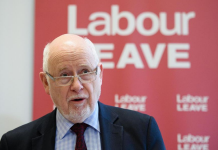The United Kingdom will send elite forces to the Gulf of Oman to protect its warships amid rising tensions with Iran, according to The Sunday Times.
The planned deployment follows Thursday’s attacks on two oil tankers, which the U.S. has blamed on Iran. British Foreign Secretary Jeremy Hunt on Friday said the U.K. would make its own assessment, but believed the U.S. claim that Tehran was behind the incident.
One hundred Royal Marines are expected to be deployed “within weeks” to join naval ships operating from the U.K.’s new naval base in Bahrain, The Sunday Times reported, citing unnamed military sources.
The Marines will police the strait from helicopters and smaller boats, in a “force protection” mission that has been planned for several weeks due to rising tensions with Iran, according to the newspaper.
Yet the British defense ministry sought to downplay the move, telling The Sunday Times:
This is a pre-planned training deployment and is in no way related to the ongoing situation in the Gulf of Oman.
Iran has denied any involvement in the oil tanker attacks, but the U.S. claims it has video evidence proving Iranian forces were responsible.
Trump administration providing ‘false’ information about Gulf of Oman attack, says Japanese tanker owner
The tanker seen in the black and white video released by the US Navy is the Japanese-owned Kokuka Courageous. While the US Navy referred to a magnetic mine, the head of Kokuka Sangyo shipping company Yutaka Katada said that “something seems to have flew in,” according to the ship’s crew.
“The crew members are saying that they were hit by a flying object. They saw it with their own eyes,” he told reporters in Tokyo. The impact happened above the water line. The crew took “evasive manoeuvres” but were hit again three hours later. There was no damage to goods and fuel, and it is unlikely that the ship would sink, Katada said.
“It seems that something flew towards them. That created the hole, is the report I’ve received,” Mr Katada said at a press conference in Tokyo on Friday, the Financial Times reported. Mr Katada also described reports of a mine attack as “false” according to several outlets in attendance at the press conference.
Tensions between Iran and the West have soared after Washington withdrew from the nuclear deal last year and reimposed sanctions on the country. In May, the U.S. cancelled waivers that had allowed a small group of countries to continue buying Iranian oil despite the reimposition of U.S. sanctions.
In December, Iranian President Hassan Rouhani had warned that “if one day [the U.S.] want to prevent the export of Iran’s oil, then no oil will be exported from the Persian Gulf.”
The narrow shipping lanes in the region are packed with oil tankers. A third of the world’s crude oil supplies passes through the Strait of Hormuz, which separates Iran from Oman and the United Arab Emirates.
Tehran has protested to the U.K. ambassador to Iran, Rob Macaire, after Hunt said Iran was “almost certainly” behind the attack, according to the BBC. However, a U.K. Foreign Office official said it was not a formal summons, as reported in other media.
Military and national security officials will discuss Britain’s role in the Gulf of Oman crisis at an emergency meeting on Monday, according to The Sunday Times.
On Friday the UN chief Antonio Guterres called on all actors in the region to “avoid a major confrontation.” The US and UK have accused Iran of attacking tankers transiting through the Persian Gulf.
UN Secretary-General Antonio Guterres late Friday called for an independent investigation into apparent attacks on tankers transiting through the Persian Gulf, Strait of Hormuz and Gulf of Oman.
“We believe it is very important to avoid, at all costs, a major confrontation in the Gulf,” said Guterres in New York. “At the present moment, we don’t see a mechanism of dialogue possible to be in place.”
Jeremy Corbyn says UK government increasing threat of war without ‘credible evidence’ Iran was behind Gulf tanker attacks
Jeremy Corbyn has warned against blaming Iran for an oil tanker attack without “credible evidence”, as he claimed the UK government’s hard-line rhetoric risked escalating conflict with Tehran.
This is a "Pay as You Feel" website Please help keep us Ad Free.
You can have access to all of our online work for free. However if you want to support what we do, you could make a small donation to help us keep writing. The choice is entirely yours.

























